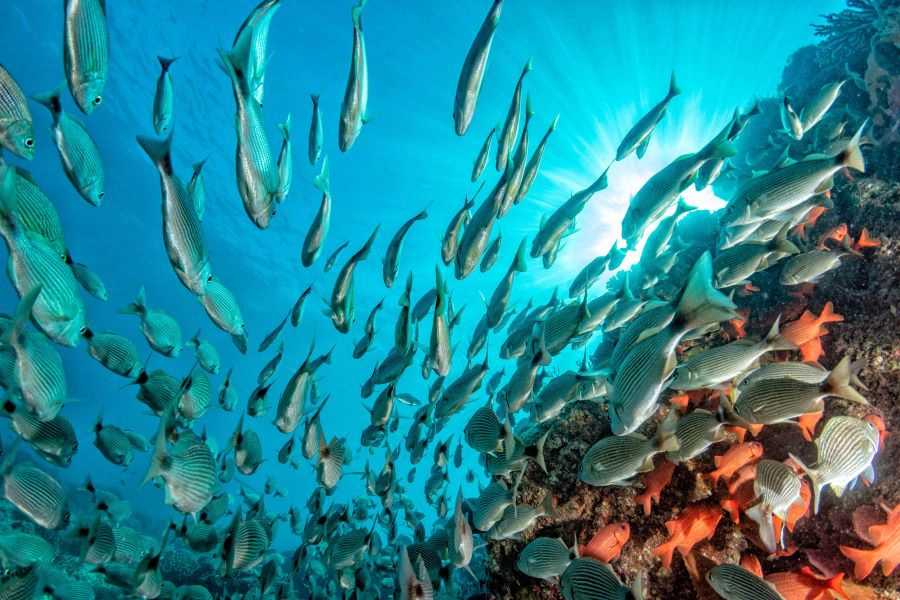The UN Food and Agriculture Organization (FAO) and the EU have launched an initiative to increase access to safe and nutritious aquatic foods for vulnerable populations in Africa and Latin America.
The New Aquatic Food Value Chains for Sustainable Healthy Diets in Fragile Contexts (NAVAC) will run from 2025 to 2030 in Chad, Colombia, Guinea-Bissau, Mauritania, and South Sudan.
FAO adds that NAVAC will also make local economies more resilient by focusing on innovation in aquatic value chains. FAO and the Technical University of Denmark will be implementing NAVAC.
“The main aim of NAVAC is to expand the supply of sustainable, affordable, safe, and nutritious aquatic foods and ensure that it reaches nutritionally vulnerable populations while at the same time providing economic benefits to local communities through Blue Transformation innovations in aquatic food value chains,” says Godfrey Magwenzi, deputy director-general of FAO.
Ocean fish are vital for nutrition and livelihoods, supplying millions with essential nutrients like omega-3s, iron, and zinc.
Transforming aquatic food systems
FAO explains that aquatic foods are an essential source of protein and micronutrients for at-risk groups of malnutrition, including children and pregnant and lactating women.
Although this food source also lowers non-communicable disease risks, FAO says many food and nutrition plans overlook aquatic resources.
“NAVAC promotes innovative and integrated approaches to value chain development, from ‘net to plate,’ ensuring that interventions advance food security and nutrition outcomes, strengthen livelihoods, and enhance environmental sustainability,” comments Deputy Permanent Representative of the EU to FAO, Minister Counsellor Annette Schneegans.
“It reflects the EU’s commitment to the Global Gateway strategy.” This project seeks to overcome global challenges, such as improving health systems and boosting global supply chain security and competitiveness.
Furthermore, FAO says NAVAC aligns with FAO’s Four Betters: Better Production, Better Nutrition, a Better Environment, and a Better Life, leaving no one behind. It also supports FAO’s Blue Transformation roadmap on updating aquatic food systems, making them more efficient, inclusive, resilient, and sustainable.
Research to strategies
FAO and the Technical University of Denmark will first analyze aquatic food value chains in participating countries. They will mark opportunities for improvement from knowledge gaps.
The research’s results will be used to create strategies for increasing the supply of healthy aquatic food to the most needy.
Additionally, the researchers will examine new advanced biotechnologies and product development processes for efficient solutions.
Ocean protection and regulations
There have been increased global efforts to protect the ocean and marine life from exploitation.
For example, the recent WTO Fisheries Subsidies Agreement aims to protect fish stocks from illegal, unreported, and unregulated fishing by limiting subsidies. However, WorldFish Nutrition told Nutrition Insight that its benefits may favor industrial fleets unless equity for small-scale fishers is prioritized.
We recently spoke to a research scholar at the Center for Ocean Solutions at Stanford University, US, who said the WTO fisheries agreement’s benefits will depend on how it impacts small-scale fishers versus industrial fleets. Small, nutrient-rich fish are vital for human nutrition, yet are often diverted to feed farmed fish, creating trade-offs between local diets and aquaculture production.
Ensuring fair access to aquatic foods requires nutrition-sensitive aquaculture, fewer feed trade-offs, and policies that balance local needs with global sustainability.
Meanwhile, the International Union for the Conservation of Nature (9–15 October) Motion 032 was recently passed this month. It is a global agreement to end the devastating bottom trawling and other destructive fishing methods while protecting deep-sea habitats. It urges governments, regional fisheries bodies, and industry to protect biodiversity hotspots.
Furthermore, starting in 2026, the UN High Seas Treaty will be operational, protecting marine biodiversity in international waters.
In related news, Nutrition Insight previously examined how krill trawling regulations fall short, and greater international scrutiny is driving the demand for plant-based nutrition alternatives sourced from algae.

